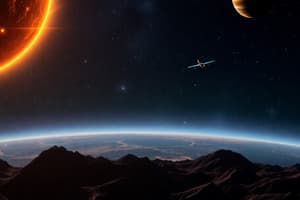Podcast
Questions and Answers
Which planet is closest to Earth?
Which planet is closest to Earth?
- Mars
- Mercury
- Venus (correct)
- Jupiter
What is the name of the only natural satellite of Earth?
What is the name of the only natural satellite of Earth?
- Titan
- Moon (correct)
- Ganymede
- Phobos
Which celestial body is classified as a dwarf planet by the International Astronomical Union?
Which celestial body is classified as a dwarf planet by the International Astronomical Union?
- Mars
- Pluto (correct)
- Saturn
- Venus
What is the primary source of energy for the solar system?
What is the primary source of energy for the solar system?
What is the primary difference between a planet and a satellite?
What is the primary difference between a planet and a satellite?
What is the name of the movement of a planet around its own axis?
What is the name of the movement of a planet around its own axis?
Which planet is known for having rings around it?
Which planet is known for having rings around it?
Which statement about stars is FALSE?
Which statement about stars is FALSE?
Flashcards
Solar System
Solar System
The family of the Sun, eight planets, and their satellites.
The Sun
The Sun
The center of the solar system and source of energy for life on Earth.
Planets
Planets
Eight celestial bodies that revolve around the Sun, including Earth.
Natural Satellites
Natural Satellites
Signup and view all the flashcards
Artificial Satellites
Artificial Satellites
Signup and view all the flashcards
Revolution
Revolution
Signup and view all the flashcards
Rotation
Rotation
Signup and view all the flashcards
Star
Star
Signup and view all the flashcards
Study Notes
The Earth and the Solar System
The solar system consists of the sun, eight planets, and their moons. The sun is at its center and is the primary energy source, making life on Earth possible. The eight planets are Mercury, Venus, Earth, Mars, Jupiter, Saturn, Uranus, and Neptune, with Jupiter being the largest and Mercury the smallest. Mercury is closest to the sun, while Neptune is the furthest. Satellites, which can be natural or artificial, orbit planets, with the moon being Earth's only natural satellite. Stars, including the sun, are large, self-luminous bodies made of burning gases. Kalpana Chawla, an Indian-born American astronaut, was the first woman of Indian origin in space. Pluto was reclassified as a dwarf planet by the IAU. Earth's rotation causes day and night, while its revolution precedes seasons. Sunlight takes about 8 minutes to reach Earth.
Studying That Suits You
Use AI to generate personalized quizzes and flashcards to suit your learning preferences.



